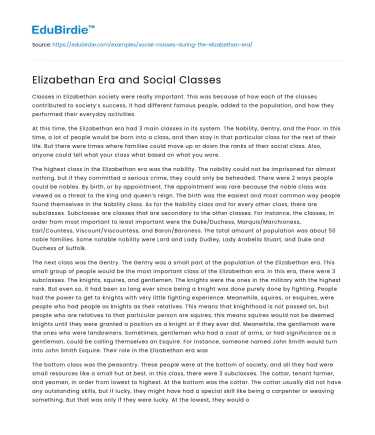Classes in Elizabethan society were really important. This was because of how each of the classes contributed to society’s success, it had different famous people, added to the population, and how they performed their everyday activities.
At this time, the Elizabethan era had 3 main classes in its system. The Nobility, Gentry, and the Poor. In this time, a lot of people would be born into a class, and then stay in that particular class for the rest of their life. But there were times where families could move up or down the ranks of their social class. Also, anyone could tell what your class what based on what you wore.
Save your time!
We can take care of your essay
- Proper editing and formatting
- Free revision, title page, and bibliography
- Flexible prices and money-back guarantee
The highest class in the Elizabethan era was the nobility. The nobility could not be imprisoned for almost nothing, but if they committed a serious crime, they could only be beheaded. There were 2 ways people could be nobles. By birth, or by appointment. The appointment was rare because the noble class was viewed as a threat to the king and queen’s reign. The birth was the easiest and most common way people found themselves in the Nobility class. As for the Nobility class and for every other class, there are subclasses. Subclasses are classes that are secondary to the other classes. For instance, the classes, in order from most important to least important were the Duke/Duchess, Marquis/Marchioness, Earl/Countess, Viscount/Viscountess, and Baron/Baroness. The total amount of population was about 50 noble families. Some notable nobility were Lord and Lady Dudley, Lady Arabella Stuart, and Duke and Duchess of Suffolk.
The next class was the Gentry. The Gentry was a small part of the population of the Elizabethan era. This small group of people would be the most important class of the Elizabethan era. In this era, there were 3 subclasses. The knights, squires, and gentlemen. The knights were the ones in the military with the highest rank. But even so, it had been so long ever since being a knight was done purely done by fighting. People had the power to get to knights with very little fighting experience. Meanwhile, squires, or esquires, were people who had people as knights as their relatives. This means that knighthood is not passed on, but people who are relatives to that particular person are squires, this means squires would not be deemed knights until they were granted a position as a knight or if they ever did. Meanwhile, the gentleman were the ones who were landowners. Sometimes, gentlemen who had a coat of arms, or had significance as a gentleman, could be calling themselves an Esquire. For instance, someone named John Smith would turn into John Smith Esquire. Their role in the Elizabethan era was
The bottom class was the peasantry. These people were at the bottom of society, and all they had were small resources like a small hut at best. In this class, there were 3 subclasses. The cottar, tenant farmer, and yeomen, in order from lowest to highest. At the bottom was the cottar. The cottar usually did not have any outstanding skills, but if lucky, they might have had a special skill like being a carpenter or weaving something. But that was only if they were lucky. At the lowest, they would only have a shack to live in. On the contrary, it was not the worst for the cottar, as they probably an acre or two of land. Above them was the tenant farmers, or the husbandmen. He did have a good amount of land, but that land was probably owned by someone a class above them. This land was used to make food for other people, and also for themselves so they can survive. In fact, working for making food was necessary as they would have to pay their high ups later on in the future. Finally was the yeoman. The yeoman was one of the people who could own lands so they could sell that land to the tenant farmers. They would contribute by doing the same things every peasant did. They would help out farming, and if a yeoman could engross their savings, they had the chance to go to the gentry. People might think that it happens often in this era, where some people from the peasantry class would be more than welcome to exit their life as a peasant and move up to be a part of the most important group of the time, the Gentry. Contrary to popular belief, this is false, as most people from the peasantry do not want to escape life, as they are more than happy to stay in that class because they are satisfied with their life in the Gentry class.






 Stuck on your essay?
Stuck on your essay?

